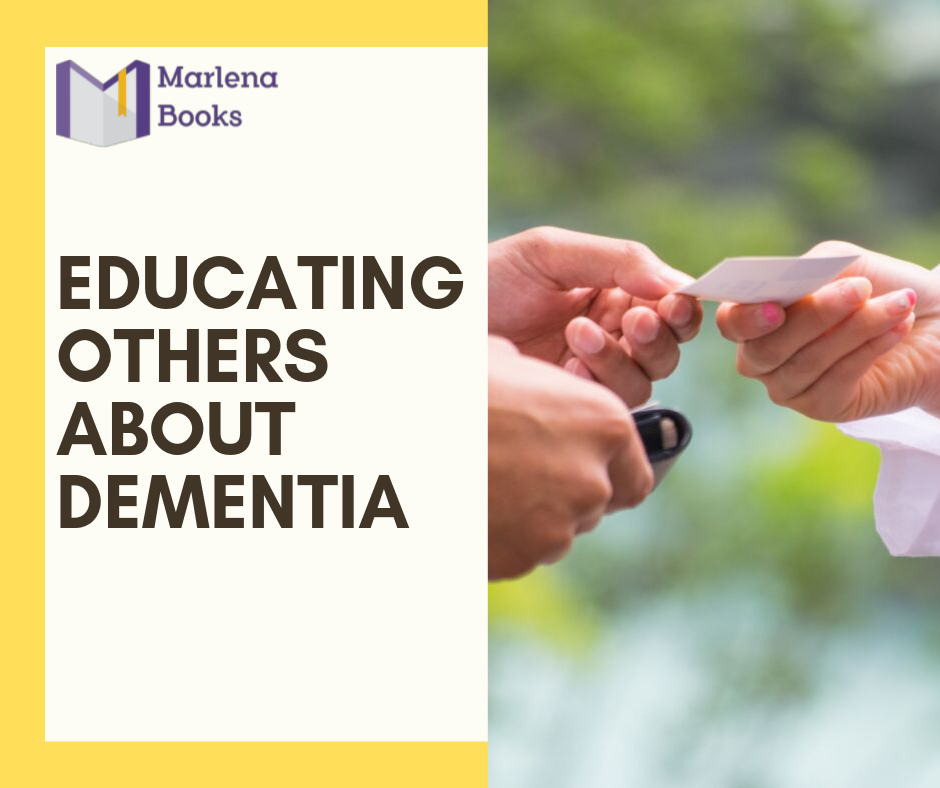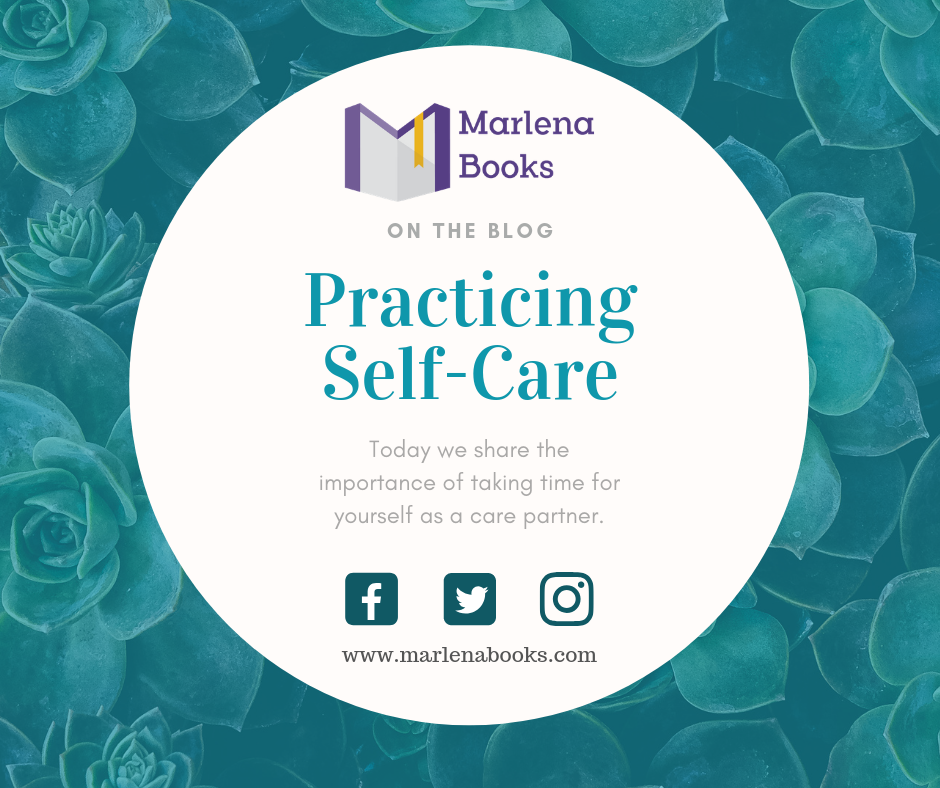News — caregiving

Explaining Frontotemporal Dementia
When people hear the word dementia, they often think of older adults, end-stage dementia, and long-term care homes. However, many individuals living with dementia can be much younger and are living well in their own communities. It is important to educate the community on what dementia might look like, challenge the stigma that surrounds it, and implement best practices for persons with FTD to live well.
References
Alzheimer Society of Canada. (2018). Frontotemporal dementia. Retrieved from https://alzheimer.ca/en/Home/About-dementia/Dementias/Frontotemporal-Dementia-and-Pick-s-disease
Mayo Clinic. (2016). Frontotemporal dementia. Retrieved from https://www.mayoclinic.org/diseases-conditions/frontotemporal-dementia/symptoms-causes/syc-20354737

Educating Others about Dementia
Have you ever been in public and feel as if nothing is going right? For example, have you been in a restaurant and your loved one with dementia is saying something inappropriate or drawing attention? Have you ever felt embarrassed about a certain situation?
While it might feel like the whole world is looking at you and your loved one, this is a great opportunity to educate others about dementia and explain to them why the situation might have occurred. However, we know that some persons with dementia are not always comfortable disclosing their diagnosis due to the stigma that still exists.
When we would take our grandmother out to a restaurant for dinner we wished we created a card that was discrete enough to share with others that her behaviours might have been a bit of the 'ordinary' because of her dementia diagnosis. We also wanted to thank people around us for being so patient and understanding during the situation.
As a result, we have created a resource card, the size of a business card to share with others in public and inform them of dementia and use it as an educational tool. While many times we were unable to educate our server, cashier, or salesperson that our grandmother had dementia in that moment, we wished that we had something to inform them so that our grandmother did not feel uncomfortable.

By sharing a dementia diagnosis with the public and people working in customer service, this helps to educate society and inform people of ways that we can better support persons living with dementia in their communities to live well, without feeling embarrassed.
We also want to note that these cards should not be used as an 'excuse' or for the public to treat people with dementia differently or ignore them. We want to use these cards as a way to be more inclusive, educate others, and for businesses to be able to offer the best service for persons living with dementia.
What are some ways you educate the public about dementia? Share with us in the comments below.

Dementia and Loss of Appetite
Are you noticing your relative with dementia no longer has the same appetite as they once did? For many persons living with dementia, they often experience a loss of appetite.
In this post, we discuss tips and strategies for ensuring your relative with dementia receives the best care and nutrients when they experience a loss of appetite.

Managing Care with Multiple Care Partners
Are you feeling stressed as a care partner trying to manage your loved one's care alongside your family or friends? This can be a difficult situation to solve, but with organization, communication, and honesty, the process can be much smoother for everyone involved.
1. Stay Organized
The most important aspect to consider is organizational skills. Do you have multiple care partners helping out throughout the week? Create a schedule for care partners but also for your loved one with dementia to ensure everyone stays organized and knows their expectations. It is important to keep the person receiving care at the forefront of their care so that they understand who is taking them where or who is coming to visit them. Let them make choices about their own care.

Plan a meeting and write down your schedules to avoid misunderstandings and keep everyone on track with the care plan. This also makes it easier if someone is no longer able to help out and can reduce frustrations for everyone. Keeping a whiteboard calendar in your house can help with managing schedules.
2. Have Open Communication Often
Communication is essential to reduce stress, keep everyone informed, and reduce any conflicts that may arise. Living in the age of so much technology, use it to your advantage. Create group chats via text, Facebook, emails, etc. to stay in touch and to ensure everyone knows what is happening. This way, it reduces any time conflicts and lets everyone be a part of the conversation.
3. Be Honest
Is one member feeling much more stressed than others? Have an honest, open conversation about how you are feeling to limit negative situations. If members of the care team are stressed, the person receiving care will also feel stressed.

While this might be a difficult conversation to have, it is important to ensure that everyone, including all care partners are feeling understood and equal. Caring should be fair to everyone, and sometimes one person might feel like they are doing all the work with no space for themselves.
4. Maintain Relationships
Don't let your care plan interfere with your previous relationships. You are working as a team to support your loved one with dementia. Care with love, openness, and mutual understandings. Remember that while caring can be burdensome at times, it is also so rewarding and comes from a place of love and support.
What are some of your strategies for caring with multiple care partners? Share with us in the comments below.

Are you feeling forgotten?
Has your loved one with dementia progressed along their journey? Are you finding they are no longer recognizing you and are you feeling forgotten? Unfortunately this experience is quite real for many persons living with dementia and their relatives and friends. But it doesn't have to be a negative experience. There are ways to support both yourself and your loved one throughout this next chapter.

A person with dementia is still themselves
Individuals living with dementia are still themselves and they are still here. It is up to us to recognize them, and not for them to always recognize us. They are still able to interact, whether verbal or non-verbal and you can still connect no matter how far along you are on the dementia journey. Reflect on all of the special moments you've had throughout your lives and continue to connect even in this chapter.

Be there for them
Relatives might find this experience difficult to cope with and may no longer want to visit with them if their loved one no longer recognizes them. Doing this might only perpetuate the lack of recognition. However, visiting will still help them to remember you, your voice, or how your hand feels in theirs. Continue to connect and you'll be surprised when you connect over a look, a wink, or a touch of the hand.
The power of touch
While they may no longer be able to verbally say who you are or might seem disinterested in the conversation, know that persons living with dementia are still able to connect. There are many benefits through touch, whether through a hug, touch of a hand, or pat on the back.

It's not their fault
Avoid blaming the person with dementia with their lack of recognition. It's not their fault that they might struggle expressing your name or who you are to them. Avoid phrases such as, 'do you remember me?' Or 'what's my name?' This might only contribute to further frustrations. Instead, tell your relative with dementia who you are and greet them as you always have, while maintaining their personhood.
Do you have any special moments with your loved one with dementia you'd like to share? Comment in the box below.

Tips for Travelling with Dementia
Planning on travelling with your loved one with dementia this long weekend? Whether it's a short trip or a long trip, we are sharing some tips on how to make it the most comfortable experience for everyone.

Practice Patience
It is important to remain patient during your trip or tensions might be high during your trip. Give yourself extra time whether you are driving or flying. Giving yourself more time to get to where you need to be will reduce stress and keep everyone in a better mood as there is not as much of a rush to get there on time.
Stay Relaxed
If you notice that you or your loved one is becoming stressed, recognize this and practice coping methods to reduce this stress. Taking a few deep breaths or pausing for a minute or so will help to feel refreshed and a bit calmer. Perhaps listen to your favourite music for a bit and boost your mood.
Go with the Flow
This is much easier said than done. If things aren't going quite your way, take a deep breath and let things happen how they might continue to happen. Try to maintain composure if the trip might not be going your way and keep your focus on keeping your loved one with dementia relaxed and comfortable. Becoming frustrated and short will only worsen the situation and make a person with dementia feel that much worse. Brush it off, laugh it off, and make the most out of your trip.
Stay Organized and Be Prepared
Preparing for the trip is of utmost importance to have a trip go smoothly. Think of the unthinkable and ensure everything is organized prior to leaving. Be prepared and pack activities to do, such as a Marlena Book, music, word games, or anything that might bring your loved one comfort. Pack some snacks and drinks for the journey. Ensure to have medications, an extra change of clothes, and any other health related items easily accessible.

Check In
Continue to check in on your loved one, are they thirsty? Hungry? In need of a restroom break? Check in and ensure their comfort. This will lead to a better trip and might help reduce any negative experiences.
Stay Together
Ensure to stay together and do not separate too far from one another. Places that are unfamiliar to persons with dementia might cause frustration and be overwhelming. Having a familiar person alongside them for the journey will help them feel relaxed and comforted.
Flying
If you are flying, there are some important things to remember. If walking might be challenging, arrange for a wheelchair on the flight and have an attendant assist you and your loved one on and off the plane. Keep all important documents with you and easy to access to reduce the stress of losing items. Arrange a flight that will be comfortable for a person with dementia, whether that be at a good time of day for them, no layovers, or extra leg room, there are many considerations to be made before flying to ensure comfort. Speak to a travel agent prior and disclose their dementia journey to review options that might be available to make for an even better trip.

Have Fun and Create Memories
Whether the trip doesn't go the way you planned, the importance is the journey. Have fun spending time together and creating memories you might not have if you stayed home. Time goes by fast, so don't get caught up in the minimal things, but look at the bigger picture and enjoy the moment. Once you reach the destination, relax! You've made it! Have fun and enjoy vacation together!
Do you have any tips or tricks for travelling? Share with us in the comments below!

Apathy and Dementia
What is apathy?
Apathy is typically defined as a lack of motivation or disinterest in certain activities.1 It can be due to a dementia diagnosis and can impact their quality of life and their care partners' quality of life. When not identified correctly, apathy can look very similar to depression or laziness. For most persons living with dementia this is not usually the case, as apathy might be mistaken for depression.
What is the prevalence of apathy in persons with dementia?
Apathy is a very common behaviour associated with dementia. Research has found that approximately 70% of persons living with Alzheimer's disease exhibit apathetic behaviours.2-6
What is the impact of apathy?
Apathy can affect not only persons living with dementia but their care partners as well in terms of their emotional well-being. If unrecognized, apathy can have a greater impact, as persons with dementia who are more motivated typically experience a reduction in cognitive decline.
How can we better support persons living with dementia who experience apathetic behaviours?
It is important to know the signs of apathy before jumping to conclusions. If your loved one with dementia is less willing to participate in activities, carry out activities of daily living, or might struggle getting out of bed, they could be showcasing apathetic behaviours.
As a way to address this, there are limited pharmacological interventions, but more non-pharmacological interventions that are better suited to supporting people with dementia to live well. For example, therapeutic recreational activities can help to improve their quality of life and boost their mood. Activities that include stimulation and creativity have been found to have a positive impact. Other activities include cooking, Montessori methods, music, exercise, and pet companionship.1
We are hopeful at Marlena Books that reading would also help to improve quality of life and reduce apathetic behaviours as it is a cognitively stimulating activity, however, we can not make any conclusions given the scant research on reading and dementia.
So what does this all mean?
Based on all of this information, now what can you do to best support yourself, as a care partner, and also your loved one with dementia? Our advice is to continue to keep your loved one with dementia engaged in activities, socializing with others, and maintain their sense of community. This will help to boost their mood and also offer them with a sense of purpose. For yourself, recognize the signs of apathy and gain support from others. Whether that be enrolling your relative with dementia in an adult day program or seek a respite program, take time for yourself to regroup and come back with a positive attitude. While some days you might need a rest, it is important to continue keeping both yourself and your loved one engaged in recreation and social opportunities, as it has numerous benefits.
References
1. Brodaty, H. & Burns, K. (2012). Nonpharmacological management of apathy in dementia: A systematic review. The American Journal of Geriatric Psychiatry, 20(7), 549-564. doi: 10.1097/JGP.0b013e31822be242
2. Robert, P. H., Darcourt, G., Koulibaly, M. P., Claret, S., Benoit, M., Garcia, R., Dechaux, O., & Darcourt, J. (2006). Lack of initiative and interest in Alzheimer's disease: A single photon emission computed tomography study. European Journal of Neurology, 13(7), 729-735. doi: 10.1111/j.1468-1331.2006.01088.x
3. Marin, R. S., Firinciogullari, S., & Biedrzycki, R. C. (1994). Group differences in the relationship between apathy and depression. The Journal of Nervous and Mental Disease, 182(4), 235-239. doi: 10.1097/00005053-199404000-00008
4. Benoit, M., Dygai, I., Migneco, O., Robert, P. H., Bertogliati, C., Darcourt, J., Benoliel, J., Aubin-Brunet, V., & Pringuey, D. (1999). Behavioural and psychological symptoms in Alzheimer's disease. Relation between apathy and regional cerebral perfusion. Dementia and Geriatric Cognitive Disorders, 10(5), 511-517. doi: 10.1159/000017198
5. Hart, D. J., Craig, D., Compton, S. A., Critchlow, S., Kerrigan, B.M., McIIroy, S. P., & Passmore, A. P. (2003). A retrospective study of the behavioural and psychological symptoms of mid and late phase Alzheimer's disease. International Journal of Geriatric Psychiatry, 18(11), 1037-1042. doi: 10.1002/gps.1013
6. Starkstein, S. E. Jorge, R., & Mizrahi, R. (2006). The prevalence, clinical correlates, and treatment of apathy in Alzheimer's disease. European Journal of Psychiatry, 20(2), 96-106.

Practicing Self Care as a Care Partner
Being a care partner for your loved one with dementia can be stressful at times and can sometimes change the relationship you had prior to diagnosis. Today is International Self Care day, and we are sharing ways to take care of yourself as a care partner.
1. Recognize care partner burnout
Feeling burnt out? If you're feeling tired, stressed, and drained, recognize these signs and take action. Just because you're a care partner does not mean you can not prioritize your own health. Recognize how you feel before it takes a greater toll on yourself. Make a plan on how you can move forward and incorporate self-care practices into your routine to take care of yourself.
2. Seek support
Being a care partner does not mean you have to be alone on this journey. Seek out support from family members, friends, support groups, professionals, or online forums. Talking about your feelings can help reduce feelings of burden and stress and you can find more resources to better support you and your loved one on the dementia journey.
3. Take a break
As previously mentioned on our blog, adult day programs are a great way for care partners to take a break while their loved one is engaging in social activities. You can also seek out respite programs in your community and enroll your loved one in a respite stay if you are looking for a longer break. Have an open conversation with your loved one with dementia and make this a positive experience for them. They will understand and might also enjoy a break to feel refreshed and well rested.
4. Spend time doing your favourite activity
Have you been putting off a favourite hobby or social activity? Take time and spend time doing what you love! This will help boost your spirit and relieve your stresses.
5. Spend time engaging in an activity together
Take time to breakaway from the care partner relationship, and engage in a fun activity with your loved one with dementia! It does not have to be big, but something you both loved doing. Doing so will bring you closer and enjoying time together will put both of you in a better mood. Laughter is the best medicine.
6. Incorporate self-caring practices into your daily routine
Life gets busy, especially as a care partner, taking at least 10 minutes a day to an activity geared towards self-care can boost your mood each day. Make this part of your daily routine and this will help to lessen those feelings of care partner burnout. Some activities you can easily incorporate are: writing down three things a day that you're grateful for, meditation, engaging in a hobby, yoga or exercise. Remind yourself daily that you are doing your best and are helping your loved one along their dementia journey.
How do you practice self-care? Share with us in the comments below!

Are you Sun Safe?
Summer is in full effect in Canada and we're sharing tips for individuals with dementia to stay safe in the sun.
Is an Adult Day Program Right for You?
Along the dementia journey, you might start to think about adult day programs (ADPs) for your loved one with dementia. This might be a difficult decision to make and many individuals think of ADPs in a negative light, as you might not think your loved one belongs in an ADP or might not understand why they are attending. On the blog, we discuss the pros and cons for seeking ADPs and how we can help eliminate the stigma associated with ADPs.
Not sure of what an ADP involves?
ADPs offer a partial or full day of programming that takes place in the community for adults who might have a disability, condition, or illness and require a safe environment with care staff available to help support them if needed. ADPs can be specific to persons living with dementia, but do not have to be. That being said, 47% of individuals who attend ADPs are individuals with dementia1. Care that is typically offered in ADPs include assisting with activities of daily living, any medical needs, such as reminders to take medications, and meals are often provided for participants2. Participants often engage in discussions, cognitive, social, and physical activities, form relationships, and are in a safe environment. Some ADPs also offer support groups for care partners who are interested in gaining support from other community members who might be experiencing a similar situation.
Let's start with the positives of ADPs and how they can assist you and your loved one along the dementia journey.
1. Do you find that your loved one with dementia is no longer participating in social activities?
Many individuals with dementia experience a loss of friends after their dementia diagnosis as people don't always know how to react to dementia and stigma still exists. This results in feelings of isolation and loneliness. Persons diagnosed with dementia should be engaging in both social and physical activities as they have many benefits for them, such as improved mood, a reduction in cognitive decline, improved communication skills, and helps persons with dementia to gain confidence and feel a sense of belonging and accomplishment. ADPs provide both social and physical activities in their programming, which is important for persons living with dementia based on the aforementioned benefits. While individuals are diagnosed with dementia, this does not mean their preferences change, they are still themselves and should still seek out opportunities to remain engaged in their communities, whether that be through an ADP or not.
2. Are you feeling burnt out and in need of a break?
Care partners often enroll their loved one with dementia in an ADP to take some time for themselves and have a break. ADPs typically run during the day, with programming starting around 9:30 and ending around 4:30. This provides care partners with the day to relax, run errands, do house chores, visit with friends, or engage in their own recreational activities. ADPs are a great opportunity for care partners to have a respite period and can be beneficial for the relationship as the person with dementia and care partner get a break from one another.
3. Is your loved one with dementia not sleeping as well or maybe napping too much during the day?
Maybe they are missing that cognitive stimulation of being in a routine, engaging with others, and participating in recreational activities. Physical activity and socializing are cognitively stimulating activities that help to improve sleeping. Individuals who attend ADPs typically have a routine, waking up, getting ready for the program, attending the program, and coming home in the later afternoon. This helps individuals get into a routine which might also help their sleeping routine. Sleep is important, but napping too much during the day might be due to a lack of cognitively stimulating activities and boredom. While napping is beneficial, sleeping for most of the day might affect their nightly sleep schedule. Engaging in an ADP will help them maintain a routine, be cognitively stimulated during the day resulting in feelings of tiredness, and reduce the time spent napping during the day.
4. My loved one with dementia is in the early stages of their journey and it might not be the best fit.
ADPs are often offered for individuals along any stage of their journey. Finding the right match for you and your loved one with dementia is essential. If you're interested in enrolling your loved one, visit some ADPs in your community and see what stage individuals are at and if your loved one would feel comfortable in the space. Speaking with your local Alzheimer Society will allow you to get to know each ADP in your community and gain insight on which one might be best for you and your loved one. Speaking with friends or neighbours who are also on their dementia journey will also help you gain insight on ADPs. If your loved one knows someone who already attends an ADP, this sense of familiarity will make them feel more comfortable attending.
5. Losing relationships and seeking a connection to the community?
ADPs are a great place to meet community members in a similar situation as you and your loved one. ADPs are a great opportunity for your loved one with dementia to engage with others who are similar to them and connect over their diagnosis. They can gain friends and support along their dementia journey. For care partners, you can connect with one another and remain integrated in your community with others who are in a similar situation.
6. Needing support as a care partner?
ADPs that offer support groups can help with this. Many ADPs offer separate support group sessions either during the time your loved one is at the program or after the ADP. This is a great opportunity to meet new people who are also along the dementia journey and gain support from others. It's important to talk to other people as a care partner and gain support from those around you.
7. ADPs help to track the dementia journey
Noticing any changes in your loved one with dementia? ADPs can help to track these changes while your loved one attends the program. There are many support staff who are directly interacting with persons with dementia and can make notes of any changes they might see. If you, as a care partner, might notice some changes you can always talk to staff members at the ADP and they can direct you to more resources and next steps.
Next, we'll take a look at some of the challenges to ADPs and why they might not be the right fit for you and your loved one with dementia.
1. Waitlists
Many ADPs have waitlists and this might take a while for your loved one to be accepted as a participant. While this can be a drawback, it is important if you might be interested in an ADP in the future to put your names on the list. Whether or not you are ready for it when they do call, this way this gives you the opportunity to say yes or no when the time comes.
2. Referral
Some ADPs require a referral in order to attend. Contact your local LHIN or doctor on how to receive a referral and the process involved.
3. Cost
Many ADPs cost money to attend. While looking, take this into consideration and determine whether or not you can afford ADPs or not. Reach out to resources in your community if seeking other alternatives.
4. Lack of Understanding from your Loved One
Your loved one with dementia might not understand why they're attending an ADP. Treat an ADP as a positive experience and inform them of why they're going to avoid frustrations and confusion. Other participants might have more advanced dementia than your loved one, and prior to enrolling your loved one with dementia, it is important to have an open and honest conversation with them and make sure they are comfortable attending a new place. Many ADPs ease you into their spaces with trial runs to ensure this is the best fit for them.
5. Location
Ensure the location of the ADP is the right fit for you and your loved one. This is something to consider if you have to be responsible for picking and dropping them off or if you would like to stay close in case anything might happen.
We hope this discussion helps you make the right choice for you and your loved one with dementia. It is important to talk about it with your loved one, family, and friends to ensure ADPs are right for you.
References
1. Anderson KA, Dabelko-Schoeny H, Johnson TD. The state of adult day services: findings and implications from the Metlife national study of adult day services. J Appl Gerontol. 2013;32(6):729Y748.
2. Fields NL, Anderson KA, Dabelko-Schoeny H. The effectiveness of adult day services for older adults: a review of the literature from 2000 to 2011. J Appl Gerontol. 2014;33(2):130Y163.

Losing Patience
Today we share tips on how to change your mindset when it seems nothing is going right.
Robotic Pets and Dementia
Companion robotic animals are on the rise. They help provide company for individuals living in long-term care, especially persons with dementia. They are particularly useful when residents might want some company and have limited visits from friends and family. They are also convenient as they do not require any day-to-day care, like animals do. They offer individuals with the opportunity to feel a sense of companionship and purpose in their lives.

(Retrieved from Moyle et al., 2016).
Robotic animals look, move, and sound similar to a real-life animal and individuals can engage with them to boost their social and emotional well-being (WHO, 2012). Studies have found that individuals with dementia experience an increase in relationships, relaxation, motivation, and socialization and a decrease in loneliness after engaging with robotic animals (Frennert & Ostlund, 2014; Kanamori et al., 2002; Moyle et al., 2013; Sellers, 2006; Wada & Shibata, 2007).
While these robotic pets can offer a variety of benefits for persons living with dementia, it's important to consider the price tag. Robotic pets are the most expensive, but if you're considering a realistic companion animal, there are other options. These alternatives offer different breeds that might look similar to a previous pet and might remind individuals of their own pet, offering a stronger sense of companionship.
PARO Robotic seals are very realistic and offer a variety of sensors to elicit emotional and social responses, but comes at a high price of $6400.
Ageless Innovation offer realistic Joy For All robotic animals, such as cats and dogs for $120.
Memorable Pets offer realistic stuffed animals for only $35.
Other options include Twiddle Cats that offer a variety of sensory materials for individuals to engage with for $45.
Does your loved one with dementia have a companion animal? Share in the comments below!
References
Frennert, S., & Ostlund, B. (2014) Review: seven matters of concern of social robots and older people. Int J Soc Robot 6:299–310
Kanamori, M., Suzuki, M., & Tanaka, M. (2002). Maintenance and improvement of quality of life among elderly patients using a pet-type robot. Nippon Ronen Igakkai Zasshi 39, 214–218.
Moyle, W., Cooke, M., Beattie, E., Jones, C., Klein, B., Cook, G., & Gray, C. (2013). Exploring the effect of companion robots on emotional expression in older people with dementia: A pilot RCT. Journal of Gerontological Nursing, 39, 46-53.
Moyle, W., Jones, C., Sung, B., Bramble, M., O'Dwyer, S., Blumenstein, M., & Estivill-Castro, V. (2016). What effect does an animal robot called CuDDler have on the engagement and emotional response of older people with dementia? A pilot feasibility study. International Journal of Social Robotics, 8(1), 145-156.
Sellers, D. M. (2006). The evaluation of an animal-assisted therapy intervention for elders with dementia in long-term care. Act Adapt Aging, 30, 61-77.
Wada K., & Shibata, T. (2007). Living with seal robots: its sociopsychological and physiological influences on the elderly at a care house. IEEE Trans Robot 23, 972–980.
World Health Organization (WHO), Alzheimer's Disease International (2012). Dementia. A public health priority. World Health Organization, Geneva.

